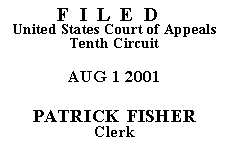

| MICHAEL SEAN EDMOND,
Plaintiff-Appellant, Defendant-Appellee. |
No. 00-1250
(D.C. No. 96-Z-2208) (Colorado) |
We turn first to the scope of our review. The district court's grant of summary judgment was filed May 3, 1999. Mr. Edmond filed his motion for reconsideration on May 23, 2000, almost one year later. The district court denied the motion on May 31, 2000, and Mr. Edmond filed a notice of appeal on June 20, 2000. The Federal Rules of Civil Procedure do not recognize a "motion for reconsideration." See Van Skiver v. United States, 952 F.2d 1241, 1243 (10th Cir. 1992). When, as here, a motion styled as a motion to reconsider is filed more than ten days after entry of the judgment, it is deemed one brought pursuant to Rule 60(b). Id. A motion under Rule 60(b), however, does not toll the time for filing a notice of appeal from the underlying judgment.(1) See Hatfield v. Bd. of County Comm'rs, 52 F.3d 858, 861 (10th Cir. 1995). Accordingly, this court has jurisdiction to review only the district court's denial of the motion for reconsideration and not the underlying judgment itself.
Relief under Rule 60(b) is a matter within the district court's discretion and is to be granted only in exceptional circumstances. Van Skiver, 952 F.2d at 1243. The only ground raised in Mr. Edmond's motion for reconsideration is his claim that the district judge should have recused herself because she had presided over criminal proceedings in which Mr. Edmond was a party. On appeal, Mr. Edmond continues to assert that the judge should have recused herself due to her participation in his criminal case and his subsequent action under 28 U.S.C. § 2255. This argument is without merit on two grounds.
First, Mr. Edmond's request for recusal is not timely. The disqualification of a federal judge is governed in the present circumstances by 28 U.S.C. § 455.(2) "Although this circuit has not attempted to define the precise moment at which a § 455(a) motion to recuse becomes untimely, our precedent requires a party to act promptly once it knows of the facts on which it relies in its motion." United States v. Pearson, 203 F.3d 1243, 1276 (10th Cir.), cert. denied, 530 U.S. 1268 (2000). The record in this case reveals that Mr. Edmond was on notice as early as February 23, 1998, that his case had been assigned to the same district judge who had presided over his criminal proceedings. See rec., doc. 41. Mr. Edmond argues on appeal that he was going to raise the issue of recusal at a hearing on April 27, 1999, but was unable to attend due to a traffic jam; however, he had notice of the facts underlying his recusal request long before that date. We therefore conclude that his request is not timely.
In addition, Mr. Edmond has not presented sufficient grounds to support a recusal request. Without more, the fact that a judge presided in a previous criminal matter involving a party is not a valid ground for recusal. See Liteky v. United States, 510 U.S. 540, 555 (1994); Green v. Dorrell, 969 F.2d 915, 919 (10th Cir. 1992); United States v. Prichard, 875 F.2d 789, 791 (10th Cir. 1989) (per curiam); see also United States v. Arena, 180 F.3d 380, 398 (2d Cir. 1999). Accordingly, Mr. Edmond's request for recusal, even if timely, is not appropriate.
The district court denied Mr. Edmond leave to proceed on appeal in forma pauperis, and Mr. Edmond renews his request before this court. We conclude that this appeal is not taken in good faith because Mr. Edmond has failed to show the existence of a reasoned, nonfrivolous argument on the law and the facts in
support of the issues raised. See McIntosh v. U.S. Parole Comm'n, 115 F.3d 809,
812-13 (10th Cir. 1997). Accordingly, we deny his request to proceed in forma pauperis and DISMISS his appeal.
ENTERED FOR THE COURT
Stephanie K. Seymour
Circuit Judge
*.After examining appellant's brief and the appellate record, this panel has determined unanimously that oral argument would not materially assist the determination of this appeal. See Fed. R. App. P. 34(a)(2) and 10th Cir. R. 34.1(G). The case is therefore submitted without oral argument. This order and judgment is not binding precedent, except under the doctrines of law of the case, res judicata, or collateral estoppel. The court generally disfavors the citation of orders and judgments; nevertheless, an order and judgment may be cited under the terms and conditions of 10th Cir. R. 36.3.
1. Although Mr. Edmond cited Rule 60(b) in both his motion to reconsider and his notice of appeal, in his notice of appeal he appeals both the denial of his motion to reconsider and the order granting defendant's motion for summary judgment.
2. Judicial disqualifications proceed under either 28 U.S.C. § 144, or 28 U.S.C. § 455. Section 144 requires the party seeking recusal to file a timely and sufficient affidavit alleging personal bias or prejudice on the part of the judge before whom the matter is pending. Mr. Edmond did not file such an affidavit, and section 144 is therefore not at issue.